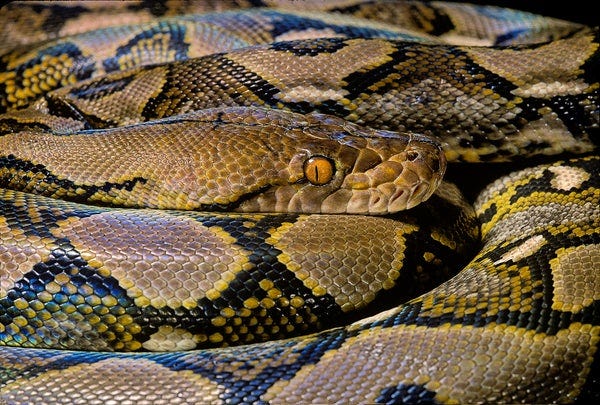Rethinking Protein: The Case for Python Farming
Snakes an a protein source for the future
Subscribe to Genomely for the latest discoveries and in-depth analyses in your inbox.
Thank you to our subscribers for your continued support and passion for science!
In a world where the search for sustainable and environmentally friendly protein sources is increasingly crucial, an unconventional proposal has emerged: farming pythons for meat. This idea, explored in recent research conducted by herpetologist Dan Natusch and his colleagues at Macquarie University in Australia, challenges traditional dietary norms and presents a potential solution to the global protein dilemma.
As the planet's population surges past eight billion, the quest for sufficient, sustainable protein sources has become more urgent. The current staples of the Western diet — particularly beef, pork, and chicken — are linked to significant environmental challenges, including greenhouse gas emissions, deforestation, and water pollution. Enter the python, an ectotherm whose unique biological features may offer an eco-friendly alternative.
Ectotherms, or cold-blooded animals, do not require energy to maintain body heat, making them more efficient in converting food into body mass. This trait, along with pythons' ability to endure long periods without food, suggests that python farming could be a highly efficient form of protein production. Natusch's team, while originally studying the distinguishability of wild versus captive-bred pythons, discovered the animals' remarkable growth rates and minimal body condition loss during extended fasts.
Despite these promising attributes, the shift towards python consumption faces obstacles, not least of which is cultural acceptance. While python meat is already consumed in parts of Southeast and East Asia, Latin America, and Africa, it remains a foreign concept to Western palates, where large reptiles are less common.
Furthermore, Monika Zurek, a food systems scientist at the University of Oxford, emphasizes the need for additional studies to fully understand the environmental impact and nutritional content of python meat. While the current research opens new doors, comprehensive analysis is necessary to determine whether python farming can truly revolutionize our food systems.
The concept of python farming highlights the broader issue of sustainability in our global food practices. It calls into question the long-term viability of our current dietary choices and underscores the need for innovation in our approach to food production. As we confront the realities of climate change and global food security, unconventional ideas like python farming may hold the key to more sustainable living.



